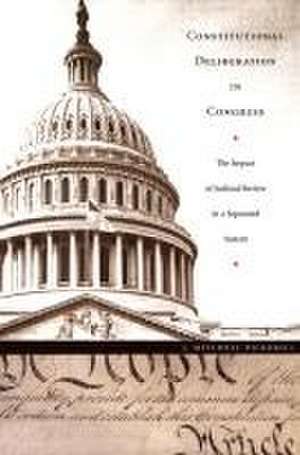Constitutional Deliberation in Congress – The Impact of Judicial Review in a Separated System: Constitutional Conflicts
Autor J. Mitchell Pickerillen Limba Engleză Hardback – 16 mai 2004
Preț: 616.36 lei
Preț vechi: 680.57 lei
-9% Nou
Puncte Express: 925
Preț estimativ în valută:
117.96€ • 122.21$ • 98.44£
117.96€ • 122.21$ • 98.44£
Carte indisponibilă temporar
Doresc să fiu notificat când acest titlu va fi disponibil:
Se trimite...
Preluare comenzi: 021 569.72.76
Specificații
ISBN-13: 9780822332350
ISBN-10: 0822332353
Pagini: 208
Dimensiuni: 168 x 241 x 20 mm
Greutate: 0.43 kg
Ediția:New.
Editura: MD – Duke University Press
Seria Constitutional Conflicts
ISBN-10: 0822332353
Pagini: 208
Dimensiuni: 168 x 241 x 20 mm
Greutate: 0.43 kg
Ediția:New.
Editura: MD – Duke University Press
Seria Constitutional Conflicts
Notă biografică
J. Mitchell Pickerill is Assistant Professor of Political Science at Washington State University.
Textul de pe ultima copertă
"Legal scholars have recently questioned judicial review on the ground that constitutional deliberation should be returned to the people and their political representatives. Drawing from case studies of several federal statutes invalidated by the Supreme Court, Mitch Pickerill thoughtfully suggests that serious constitutional discourse in the legislature is unlikely unless the Court continues to exercise its power of judicial review. I found his argumentation persuasive as well as informative." Constitutional Deliberation in Congress" is well worth reading by lawyers as well as by students of American government."--William N. Eskridge Jr., Yale Law School
Cuprins
List of Tables and Figures ix
Acknowledgments xi
Introduction 1
1. Constitutional Deliberation in a Separated System 11
2. Judicial Review: Roadblock, Speed Bump, or Detour? 31
3. The Shadows of Uncertain Scrutiny: Legislating in a Period of Judicial Dualism 63
4. The Missing Constitution: Legislating in the Darkness of Judicial Deference 95
5. The Nature of Things: Anticipation and Negotiation, Interaction and Reaction 133
Appendix A. Judicial Review Decisions and Relevant Legislation (Chapter 2 Dataset) 155
Appendix B. In-Depth Interviews 161
Notes 167
Table of Cases 175
Bibliography 177
Index 183
Acknowledgments xi
Introduction 1
1. Constitutional Deliberation in a Separated System 11
2. Judicial Review: Roadblock, Speed Bump, or Detour? 31
3. The Shadows of Uncertain Scrutiny: Legislating in a Period of Judicial Dualism 63
4. The Missing Constitution: Legislating in the Darkness of Judicial Deference 95
5. The Nature of Things: Anticipation and Negotiation, Interaction and Reaction 133
Appendix A. Judicial Review Decisions and Relevant Legislation (Chapter 2 Dataset) 155
Appendix B. In-Depth Interviews 161
Notes 167
Table of Cases 175
Bibliography 177
Index 183
Descriere
Analyzes the impact of the Supreme Court's constitutional decisions and its judicial review of statutes on lawmaking in Congress







